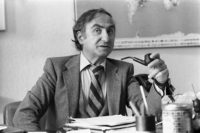VINTAGE LEBANESE DIASPORA
Nicholas Hayek

Nicolas George Hayek (19 February 1928 – 28 June 2010), was a Lebanese-American Swiss businessman, co-founder, CEO and Chairman of the Board of The Swatch Group,[2]
Born in Beirut in 1928, Nicholas Hayek was the second of three children from a Lebanese mother and a Lebanese-American father. His father trained as a dentist in Chicago, his older sister Mona is the widow of the renowned Lebanese architect Joseph Philippe Karam and his younger brother Sam, also a Swiss citizen, is a former CEO of the Swiss group Sibra.
In 1950, Hayek met Marianne Mezger in Beirut, a young Swiss au pair and daughter of Swiss industrialist Eduard Mezger. They married in 1951 and moved to Switzerland. They had two children, Nayla and G. Nicolas (Nick) Jr. In 1964, the family moved to Meisterschwanden, a village 35 kilometres west of Zürich. Hayek lived there for the rest of his life.
In 2010, Hayek was ranked the world\’s 232nd richest person with an estimated net worth of $US3.9 billion.
Very few men achieve such high iconic status in their own lifetime as that of Nicolas G Hayek. His pivotal involvement in the reconstruction of the Swiss watch industry will be studied, analysed, and emulated as an example to which many may aspire but only a very select few can achieve.
Hayek started his business career working as an actuary for Swiss Re. He then assumed briefly the management of the engineering firm owned by his then ailing father-in-law, Eduard Mezger. He soon relinquished this position to search for an opportunity \”to learn something new every day\”.
In 1963, Nicholas Hayek founded his own management consulting firm, the Zurich-based Hayek Engineering. Hayek made his mark quickly on the Swiss and European business scene by consulting and effecting successful turnarounds at several of the largest European multinationals. One of his management credos was: \”The rarest resources are entrepreneurial types in top management.\” By 1979, Hayek Engineering had over 300 clients in 30 countries. Hayek was Chairman of the Board and CEO of Hayek Engineering from its founding until his death.
In the early 1980s, Hayek was asked by a group of Swiss bankers to oversee a liquidation of two Swiss watch-making firms which were in turmoil due to heavy competition from Japanese watch manufacturers such as Seiko and Citizen Watch. Hayek believed that the Swiss watch manufacturing industry could remain competitive and that these companies could recover after a restructuring of operations and a repositioning of the different brands.[
Hayek identified problems in products, policies and distribution as well as outdated leadership that needed to be changed.
Hayek invested heavily in automation and the standardization of parts and tooling. This produced economies of scale and improved quality. Production was centralized, and parts were designed to be interchangeable.
The restructuring of the companies coincided with the invention of the Swatch watch which used only 51 parts, as opposed to the nearly 100 parts needed to make a traditional wristwatch without compromising on accuracy or quality and thus was cheaper to manufacture. The Swatch watch helped the Swiss watch industry reconquer a large share of the lower end of the watch market which it had lost to Japanese makers. Although the colorful plastic watch became quickly known for its flamboyant marketing, Hayek always emphasized that the Swatch watch was first and foremost a technological breakthrough.
Having spearheaded the reorganization of these companies for more than four years, finally bringing about their merger, Hayek, with a group of Swiss investors, took over a majority shareholding in the new group in 1985. He became chairman of the board of directors and chief executive officer in 1986. The merged company was initially named Société Suisse de Microélectronique et d\’Horlogerie, or SMH. It later changed its name to Swatch Group.
Hayek played a decisive role in the recovery of the Swatch Group with its watch brands Swatch, Blancpain, Omega, Longines, Rado, Tissot, Certina, Mido, Hamilton, Pierre Balmain, Calvin Klein, Flik Flak, Breguet and Lanco. The strategies he developed in the early 1980s led to the success of the entire Swiss watch industry and regained its leading position worldwide since 1984.
Hayek is also credited with having a fundamental role in the creation of the Smart Car, a small European car created for inner city use by Mercedes-Benz. Original names for the car revolved around the Swatch name — and even today aspects of the car such as its interchangeable body panels are clearly linked with the Swatch philosophy. The name \”Smart\” was derived by adding the first letters of Swatch and Mercedes to the word \”art\”.
Hayek was awarded the title of Doctor honoris causa of Law and Economics of the Faculty of Beni Culturali of the University of Bologna (Italy) in June 1998, after being awarded doctor honoris causa of Law and Economics of the University of Neuchatel in 1996.
Click on image to enlarge, share or comment
MORE VINTAGE LEBANESE DIASPORA
MORE COMING SOON!
We upload new images everyday from our archives of over 100,000 photos, films & ephemera of old Beirut & Lebanon.
Come back soon!
CONTACT & CONTRIBUTE
We welcome your comments & contributions
[themify_button text=\”#ffffff\” block=\”true\” color=\”#440450\” target=\”https://www.vintagebeirut.com/contact\” size=\”large\” link=\”https://www.vintagebeirut.com/contact\”]CLICK HERE[/themify_button]